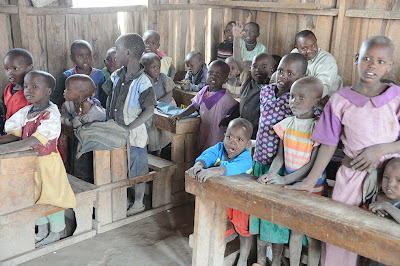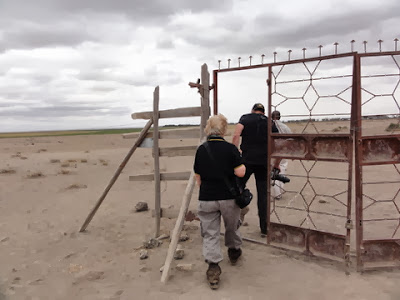Clive had been talking about visiting the
Masai Mara village and this was the day. The village is right on the outskirts
of the Amboseli National Park. What an experience. First we were met by a Masai man - James. who talked
about the village and took us over to the school. That is one room in the
middle of a dust pile.
On the way we saw a little child – I guess 2 or 3 wandering towards the school by itself. I’m not sure if it was a boy or girl. Bob and I went over and he/she stopped while we took photos and then kept wandering along and ultimately turned up at the school while we were there. We didn’t see any wild animals but it was possible as we were still in the park. Someone had deemed it OK for this child to wander off on it’s own. It’s not unusual to see small children wandering around – seemingly on their own but this one seemed very vulnerable to us. Can’t see it happening to our grandchildren!
Yes - I'm afraid these are flies on this little one's face.
But he/she arrived safely and participated in proceedings.
There were about 35 children at the school from very tiny to about 10. They go to another school when they’re older. They sang many songs enthusiastically for us. We were encouraged to take pictures. They eagerly did some arithmetic on the blackboard.
The children were fascinated when some of our party took their photos and then showed them to them. A great way of interacting with them.
Clive, Norman and Dominic presented them with some money that they had collected to buy the children school uniforms.
The floor of the schoolroom had been cemented but this was breaking up and lots of it was dirt. There were a few crude posters on the wall of ABC etc but otherwise it was bare. There were not enough desks for all the children so it was very crowded. Another 35 children would attend in the afternoon.
The teacher seemed very committed but spoke to one of our party and said how he wanted to go to university but didn’t have the money and could they help him.
It amused me that even though the fences on either side of the school gate were broken we all obediently entered and exited the gate as if it were the only way!
Masai people rate their wealth on the number of cattle and goats that they have. Although they grow crops and trade these preserving and caring for their wild stock seems most important.
We're told that many Masai have moved from their nomadic lifestyle to live successfully in urban areas but return home and wear their traditional cloak or shuka and carry the essential wooden club while they visit.
James and Clive are good friends.
The men wear sandals that they have made - often using old car tyres for the soles and lots of ankle jewellery. I believe the jewellery the men and women wear indicates their age and social status so I guess the more the better.
It's also a traditional custom to remove a lower tooth - we were told it's a sign of their belonging to the group.
A well has been donated to this village. It means that they don't have to walk long distances to collect water any more. As collecting water is a women's task I'm thinking that they must be especially grateful.
We then went over for a welcome by the adults. Approximately 30 Masai people greeted us, all in traditional costume, and sang and danced for us. Some of the men jumped very high which is seen as a sign of their physical prowess. They then gave us a blessing in Swahili.
A little help from their friends.
The women were more demure but still very impressive.
After the performing we were invited into their village. James encouraged us to ask any questions that we liked.
Most of the men spoke quite good English.
James said, in response to a question, that he only has one wife at present but he wants another one. We asked how his present wife would feel and he said OK because she gets to choose the second one. He assured us that there were more available women than men. I wonder if, when monogamy is not seen as a value as much, whether someone to help with the chores might be welcomed.
There is an area for stock to stay overnight in the middle of the village.
The women build the houses with a basic frame and cow dung in mud brick style with straw roofs. It was quite smelly and there were heaps of flies.
We went into one of their houses which was very dark so hard to see everything. These pictures were taken with a flash. There was only one small window. It had a fireplace in the floor. The children sleep at one end on one area of floor. The adults sleep at the other and their room had cow skin as a floor instead of dirt. They assured us that the house is waterproof and keeps a constant temperature.
They showed us how to make fire with acacia wood and donkey dung.
Success!
The witch doctor showed us herbs and tree roots and told us at length what they are used for. He said that they don’t do surgery (I'm pleased about that) and go to western hospitals for this. One of the plants was aloe vera which we are familiar with.
We were then taken to a market where several women were selling their wares. We were allocated one person each to take us around. The idea was that we gave the person escorting us what we wanted to buy and then we’d discuss the price afterwards. I chose a couple of necklaces and bracelets similar to what we’d seen previously and knew what a fair price was. I find bargaining in this situation difficult and they were asking far too much. Maybe this is all part of the bargaining process that we are not accustomed to. We walked away feeling bad because we wanted to support them. We finally did a deal from the vehicle as we left.
I think I will need to digest it all for a
few days. While they clearly live at a very basic level and need assistance I felt that there was a level of trying to get what they could from us and they seemed very
commercial on one level. A lot to process.
On reflection I think it would also be very easy to put my middle class Western values onto these people and I don't want to do that. All round a very insightful experience and I feel enormously grateful for the privilege and the Masai's willingness to share their lifestyle with us.





























































2 comments:
Most interesting. Thanks.
Thanks David. Yes it was a great experience.
Post a Comment